2022 Year in Review
Throughout 2022, Praxis Spinal Cord Institute has continued its work to improve quality of life for people living with spinal cord injury. In collaboration with researchers, clinical practitioners, and entrepreneurs, and under the mentorship of people with lived experience of SCI, we’ve partnered to bring solutions to the people who need it most.
As always, our work would not be possible without the generous support of our funders and donors. We thank you and look forward to continuing to make an impact in 2023.
Please read on for some of the highlights of the Praxis year.
You can also learn more about us in our 2021 Annual Report.
Read holiday message from our CEO, Bill Barrable.
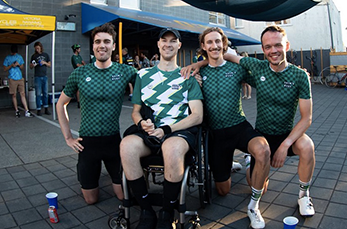
Fundraising Team Effort
This summer, the Shim’s Ride team donated over $24,000 from their annual fundraiser to Praxis Spinal Cord Institute. The fundraiser began as an epic ride among friends to raise awareness and funds for their colleague and fellow sportsman, Mathew (Shim) who was injured in August 2019 while out on a bike ride. The initial fundraiser—a 520 km ride from Port Hardy to Victoria on Vancouver Island BC—by close friends raised money to help Shim with treatment and rehabilitation for his spinal cord injury.
Formed to bring communities together to raise awareness and money for spinal cord injury, the ride is now an annual event. This year, the team decided to celebrate the return to in-person events and held a criterium, a lapped bike race on a closed course, in Victoria.
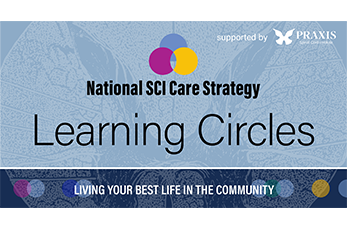
Sharing Best Practices
In 2019, Praxis started an engagement process to create a national care strategy by building on the strengths and collective wisdom of the spinal cord injury (SCI) community across Canada. Community consultation led to two reports, which lay out a framework for an actionable National SCI Care Strategy. As part of the engagement process, interviews conducted with experts in SCI care explored best practices and their implementation. These are now being animated in a monthly newsletter, Learning Circles to share insights and inspiration among the SCI community. Learn more about Learning Circles.
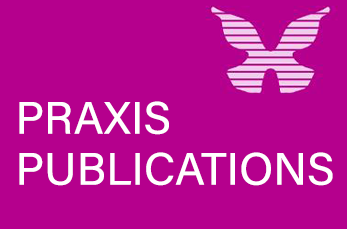
Publications
Praxis authors and researchers have been busy this year, publishing primary papers, scoping reviews and guidelines. In collaboration with partners and grants recipients, publications cover pediatric SCI, exercise and activity guidelines, and spinal cord stimulation among other subject areas.
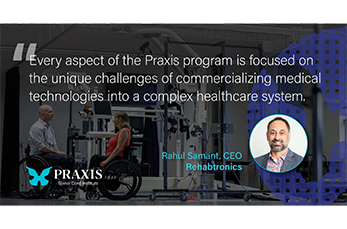
Commercialization – Translating Knowledge into Solutions
Praxis Commercialization programs advance and translate SCI research and innovation, accelerating solutions into the hands of those who need it. Mentored by our networks of international researchers, health care professionals, entrepreneurs, and investors, SCI Accelerate and SCI Incubate program companies hear directly from people with lived experience of SCI (PLEX).
Rehabtronics –Prelivia, a neurostimulation medical device, treats and prevents pressure injuries. The wireless device delivers intermittent electrical stimulation to underlying tissues, restoring blood flow and tissue oxygenation. Initial study results show 80% decrease in tissue damage and 28% increase in tissue oxygenation. Rehabtronics gained 1.25 million CAD funding from Genome BC earlier this year.
Kalogon – One of the largest health risks wheelchair users face is tissue damage and pressure sores from being seated. Kalogon’s pressure-relieving seat cushion automates regular changes in seated position using machine learning to ‘orbit’ support and redistribute bodyweight. User studies note “significant improvements in overall comfort, accelerated healing, and an ability to sit two times longer.” Veterans’ Affairs in the United States has the cushion under evaluation in 20 of their hospitals, and successful seed funding raised $3.3 million. Kalogon has also attracted support from the U.S. Air Force.
Human in Motion Robotics Inc. – XoMotion, a lower limb exoskeleton recently won funding and trial support from the Department of National Defence. Two units will be trialed at a PEI hospital with veterans undergoing rehab with motion disabilities.
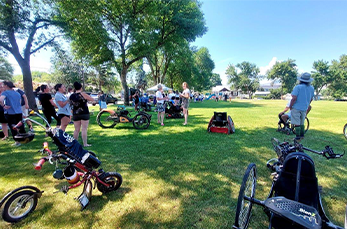
Praxis Success = Impact at the Human Level
Interior health workshops
Quality of care and support for SCI is essential but outside urban areas, practitioner access to evidence-based best practices is often limited. This translates into people with SCI having to travel to the Lower Mainland for specialized services.
Shannon Rockall and James Hektner, members of the Praxis clinical and PLEX teams, have created a series of outreach education workshops for clinical practitioners across Interior Health. Developed with input from individuals with lived experience of SCI, the interactive workshops will increase knowledge and clinical practice skills to ensure high quality care is delivered locally.
Feedback from sessions so far show increased confidence and awareness of the issues raised. Attendees appreciated hearing directly from PLEX for awareness of priorities in care.
“I can do my own reading about spinal cord injury medically; however, it was SO valuable to talk to someone about it and hear about different functional options for functional differences.”

Pressure research will soon deliver life changing tech
Research informs acute SCI care to enhance recovery, avoid further neurotrauma
Maintaining adequate pressure for the circulation of blood to the spinal cord both at the time of injury and during the early phase afterward may improve neurological recovery. Praxis has supported surgeon-scientist Dr. Brian Kwon and his research team at UBC where their work shows that personalized pressure management in the acute phase of injury may improve neurological recovery.
The CASPER (Canadian-American Spinal Cord Perfusion Pressure and Biomarker) study is looking at further clinical intervention to minimize tissue damage, with clinical sample storage in the International SCI Biobank (located in Vancouver) available to the global SCI research community. Results are already impacting standards of care for SCI in B.C. and Praxis and AOSpine are supporting the development of clinical practice guidelines to ensure this evidence is available worldwide. There’s also been development of next generation med tech for monitoring oxygenation and hemodynamics in the injured spinal cord. The implantable biosensor, based on Near-Infrared Spectroscopy technology, is heading for commercialization in a partnership grant with the Michael Smith Foundation for Health Research, and is also part of a U.S. Defense Advanced Research Project Agency grant for innovative, implantable technologies.
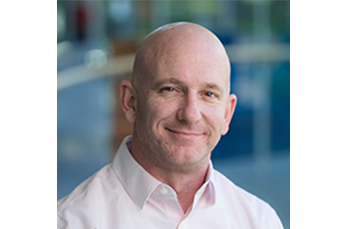
PLEX Engagement
SCS from the Lived Perspective
A life changing therapy that brings more than just the ability to walk again.
John Chernesky, Praxis PLEX Program Team Manager, has been living with SCI for more than 25 years. He took part in one of the Praxis-partner studies on spinal cord stimulation and its impact on SCI. Although the study focused on upper extremity function, John noticed better sleep, bowel and cardiovascular function in addition to increased strength and endurance, with improved hand grip and fine motor skills. The impact extended down into his torso and lower limbs.
“The positive effects were substantial; with an increase in strength and endurance, particularly in gross motor function, over a much longer time period with reduced fatigue and enhanced recovery.” Chernesky said. Praxis support for spinal cord stimulation therapy includes grant funding and research support, engagement for user feedback from people with lived experience, and commercialization mentoring for medical device innovation, which accelerates stimulation technology into clinical use. Learn More
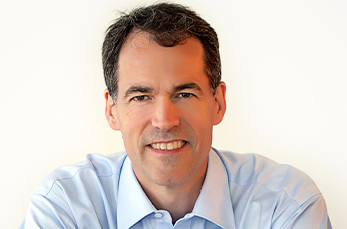
CEO outreach
Praxis CEO, Bill Barrable has been active with digital outreach this year. He penned a letter to the Globe and Mail on traumatic brain injury to encourage Hockey Canada to protect its youth players and took part in podcasts on interdisciplinary thinking for SCI innovation, and on the importance of moving knowledge into practice by bringing people with lived experience of SCI into decisions and design. Read Q&A with Bill for World SCI Day 2022.
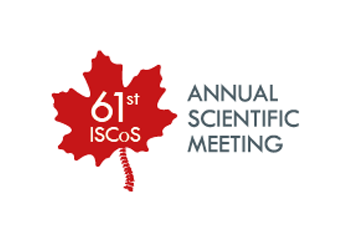
ISCoS Presence 2022
With the return to in-person events, Praxis team members were closely involved in organizing this year’s ISCoS conference held in Vancouver, BC. In addition to presentations on best care practices and cutting edge science, the team also facilitated a plenary lecture from Dr. Stacy Elliot and Dr. Andrei Krassioukov. The Commercialization Team hosted alumni from the SCI Accelerate and Incubate programs to showcase medtech innovation and success under the mentorship of people with lived experience.
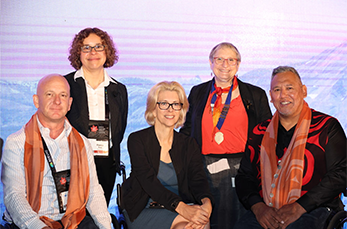
Nothing About Us Without Us – First Indigenous SCI Gathering
Praxis and Indigenous Peoples’ Liaison, Richard Peter, held the first Indigenous SCI Gathering this November, providing a space for peers with spinal cord injuries and other mobility issues to share and raise awareness on their experience as Indigenous people with a disability.
Invited peers shared insights and resiliencies from their own lives that illustrated why learning more about Indigenous experience is essential to developing solutions for health care and also research in SCI. In addition to experiences with housing, education and funding, they also highlighted the loss of community that so many experience when moving to urban areas for better service provision.
Praxis is grateful to sponsors SCI BC, BCANDS and Coloplast for their support in enabling this gathering.
How You Can Help
Donate to the Praxis Spinal Cord Institute today. Your donation will forge innovations that reduce paralysis and related complications and enable individuals with spinal cord injuries to live their best lives.
DONATE NOW

